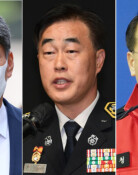[Opinion] Lee Mi-han, a South Korean Girl
[Opinion] Lee Mi-han, a South Korean Girl
Posted April. 22, 2005 23:27,
Numerous literature, pictures, and movies have depicted the Holocaust, ranging from Holocaust movies like Steven Spielbergs Schindler`s List and tragic-comics on fatherhood like Roberto Benigni`s Life Is Beautiful. And yet, not much is known to the world about the Japanese atrocities, which were to liquidate not only Korean territory but also its language and letters.
Lee Mi-han (17), a Korean girl living in the U.S., touched the country with her short essay, remembering her maternal great grandfather, Dr. Geonjae Jeong In-seung (1897-1986), a Korean linguist. At the grand opening ceremony of the Abraham Lincoln Presidential Library and Museum on April 21, Lee was chosen from more than 5,400 entrants to read her essay. She wrote it in remembrance of her maternal great-grandfather during the Japanese colonial period, as he was arrested and jailed for putting together the first Korean dictionary at a time when the language had been banned by the Japanese government: My maternal great-grandfather believed that words, the medium by which we formulate and share ideas, can bind and break the very ideas they express if the language is that of an oppressor. ...I believe that freedom in the 21st century means the liberty of individuals, regardless of age, race, gender, or class, to express themselves in their own words, and to use those words to shape history.
Moreover, President George W. Bush spoke after her and said, I extend my special gratitude to Miss Lee for decently expressing life in a free society. Lee Mi-han said, The given theme was Lincoln and a new birth of freedom but thinking about a broader theme of freedom, I wrote about the inspiration I got from my maternal great grandfather. It is miraculous how Dr. Geonjaes efforts to take back the stolen language of Korea have passed down to his great granddaughter, who was born in a foreign country.
Anyone who has stayed long enough abroad knows what a blessing it is to speak and talk in ones own language. Western imperialists from Britain and France did not deprive their colonies of their language and letters. In this respect, the Japanese act of depriving the Korean language would be remembered as the most brutal invading act in the history of civilization. By reading her essay during the nationally televised grand opening ceremony, she remembered the Japanese atrocities as history that cannot ever be forgotten.
Oh Myung-chul, Editorial writer, oscar@donga.com







